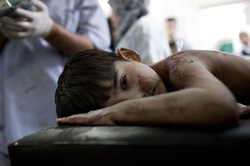 Written by Alison Hofmeyer, Communications Consultant CARE USA posted on Twitter this morning that upwards of 11,500 children have been killed in conflict in Syria and more than 1 Million have fled their homes. Seeing numbers like this is appalling. But really, how well can we wrap our head around such a massive amount of children who are either dead or displaced? It's similar to hearing that over 27 million men, women and children are trapped in the bonds of slavery (Kevin Bales, Disposable People). Or 345 million people in Africa without access to clean water (water.org). Can you actually visualize the impact of such brutality on so many people? The truth is, we probably hear,read, or write the statistic, reflect on it for a while, and move on with our lives. I'm not accusing people of not caring. I do believe, though, that the feelings of being overwhelmed and helpless many times trump our wildest ideas or dreams to radically change those statistics. I can remember the first time the numbers got to me. I was in college and I was 100% invested in educating my peers on the issue of trafficking. I had spent a month in Southeast Asia, I interned at an anti-trafficking organization, and I had read as many books as I could get my hands on on the topic. I knew the statistics, and they were unacceptable. However, I became completely bombarded one day with the reality of what I was fighting. I knew that trafficking wasn't just happening because kids didn't have a good home, or that they were all being kidnapped, etc. As I'd learned in Cambodia, there are systemic flaws that cause these people to fall victim to all kinds of atrocities. And for the first time, I felt like there was absolutely nothing I could do about it. I couldn't reproduce legal documents in Cambodia so that people could prove who they are and where they're from. I couldn't open a home big enough to house all the women and children who needed somewhere safe to be. The most common questions I was asked at all of my presentations and meetings was "What can I do about this." When all the doubt set in, I realized, I didn't know. After a few weeks of utter confusion, a slight identity crisis, and many calls to my mentor, I got back to the core of what I was fighting for. I've written before about having a "popeye moment," experiencing something so horrific or wonderful, your life will never be the same. For me, that moment came through a pair of brown eyes that disappeared all too quickly on the back of a European man's motorcycle from a brothel in Cambodia. On the days when I get overwhelmed, angry, or just want to give up and hide in the comfort of my own home, I close my eyes and think of her. And, again, as I've done many times since, I promise her I won't give up. I promise her that I will fight with everything that I have so that the suffering she endured won't be for nothing. That still doesn't tell us what to do about these issues though, does it? Well, a little research will go a long way. Here are some ways I have found to be a tangible help in battling human injustices: - Give to the Lifebox Containers. We are on the ground in these communities, empowering them and working with them. - Focus on your own community. Who is vulnerable? How can you advocate for them? Maybe that is bringing meals to a family, taking in foster children who are about to age out of the system, creating jobs in your small business for people who don't hold a 4-year degree, shopping from stores and products that are exclusively conflict free, etc. - Get educated. Read, ask questions, and be prepared to be uncomfortable. Recognize the ways in which you may contribute to issues or how you can use your resources to fight them. Go one step further than talking about it. - Get involved. There are thousands of non profits working to eliminate pain and suffering in this world. They all need donations, volunteers, specialized skills, etc. You have something to offer. Don't complicate it. Find an area in which you are passionate about and see who's working there. A quick email or phone call later, you are involved in meaningful, life giving work. The last piece of advice I would give you is to find a face. Looking at statistics will always be overwhelming. We can not grasp the impact that genocide, lack of education and clean water, trafficking, and violence (just to name a few) have on communities around the world. However, we can comprehend the impact of a 6 year old girl being raped, day after day, for the pleasure of the highest bidder. Put the person back in the issue. I promise, that will be all the motivation you need.
0 Comments
Leave a Reply. |
ContributorsDavid Neely, President and CEO of ACI. Archives
August 2020
Categories |
4105 24th Ave SE, Apt 4
Norman, OK 73071
[email protected]
PHONE: 913.747.4070
FAX: 913.897.5691
© 2013 Affecting Change International, Inc.
All Rights reserved worldwide.
Norman, OK 73071
[email protected]
PHONE: 913.747.4070
FAX: 913.897.5691
© 2013 Affecting Change International, Inc.
All Rights reserved worldwide.

 RSS Feed
RSS Feed